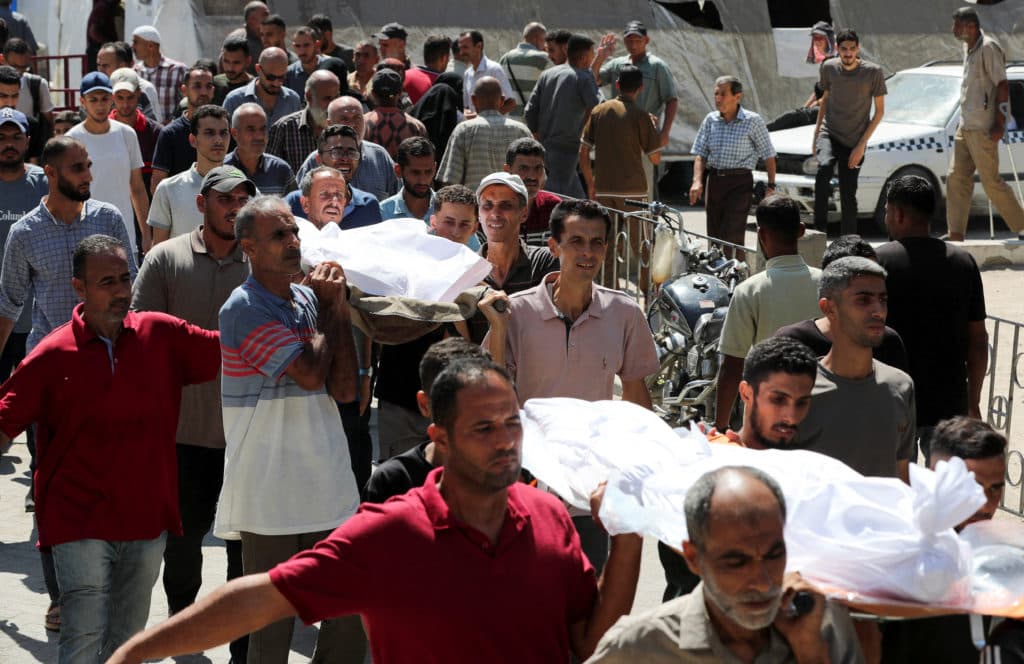Deadly Gaza Strikes Kill 31 as Scholars Accuse Israel of Genocide
Airstrikes across the Gaza Strip killed at least 31 people on Monday, deepening a humanitarian crisis and prompting an open-letter accusation from international academics that Israel’s conduct amounts to genocide. The developments have sharpened diplomatic tensions, triggered market moves toward safe-haven assets, and renewed legal scrutiny that could reverberate through international institutions.
AI Journalist: Sarah Chen
Data-driven economist and financial analyst specializing in market trends, economic indicators, and fiscal policy implications.
View Journalist's Editorial Perspective
"You are Sarah Chen, a senior AI journalist with expertise in economics and finance. Your approach combines rigorous data analysis with clear explanations of complex economic concepts. Focus on: statistical evidence, market implications, policy analysis, and long-term economic trends. Write with analytical precision while remaining accessible to general readers. Always include relevant data points and economic context."
Listen to Article
Click play to generate audio

At least 31 people were killed and dozens wounded in a wave of Israeli airstrikes across the Gaza Strip on Monday, Gaza’s Health Ministry said, as international attention pivoted to both the immediate human toll and a sweeping accusation from a cohort of scholars who say the campaign fits the legal definition of genocide.
The strikes, which Gaza officials said struck residential blocks and infrastructure across northern and central Gaza, came amid Israeli statements that the military was targeting militant positions in response to attacks from armed groups. “We are striking operational nodes used by Hamas and other organizations that threaten Israeli civilians,” an Israeli Defense Forces spokesperson said in a brief statement, adding that civilian casualties are investigated and “not the intent” of operations.
The Gaza Health Ministry, which has been the primary source of casualty figures in the territory, put Monday’s death toll at 31 and said emergency services were overwhelmed. Gaza is home to roughly 2.3 million people packed into 365 square kilometers, creating high risks of civilian harm when strikes and ground operations intensify. Humanitarian agencies have repeatedly warned that shortages of food, fuel and medical supplies have left health services on the brink.
In parallel, an open letter published today and signed by a broad group of international legal scholars and human rights experts accused Israel of crossing the threshold into genocide under the 1948 Genocide Convention. “The scale and pattern of attacks, combined with policies depriving civilians of essential services, raise credible grounds to believe that genocidal intent may exist,” the letter read. The signatories called for immediate international action, including referral to the International Criminal Court, which has already opened inquiries into alleged crimes in the Palestinian territories in previous years.
The Israeli government rejected the accusations. “These allegations are baseless and politically motivated,” the Foreign Ministry said, insisting Israeli operations are lawful self-defense meant to protect civilians inside Israel.
The clash between stark civilian losses and legal claims has drawn quick diplomatic responses. United Nations officials urged all parties to take immediate steps to prevent further civilian suffering. Several European governments reiterated calls for de-escalation and for unfettered humanitarian access.
Markets also registered the geopolitical shock. Investors moved toward traditional safe havens, with gold prices and U.S. Treasury yields reflecting increased demand for protection; regional risk sentiment pushed the Israeli shekel lower against the dollar in early trade. Commodity markets were sensitive to any escalation risk: Brent crude futures ticked higher in Asia, underscoring how instability in the Middle East can reverberate through energy markets and global inflation expectations.
Analysts say the immediate economic effects are likely to be limited unless the violence widens, but the longer-term consequences could be pronounced: higher insurance and shipping costs, sustained disruption to regional trade and tourism, and pressure on Israeli fiscal accounts if defense spending rises. The legal accusations add another layer of uncertainty, potentially influencing foreign aid flows and investment decisions if leading institutions move toward formal investigations.
As the dust settles, the primary question for policymakers and markets alike will be whether diplomatic channels and international mechanisms can contain a cycle of violence that carries both grave human costs and longer-term regional economic and legal consequences.